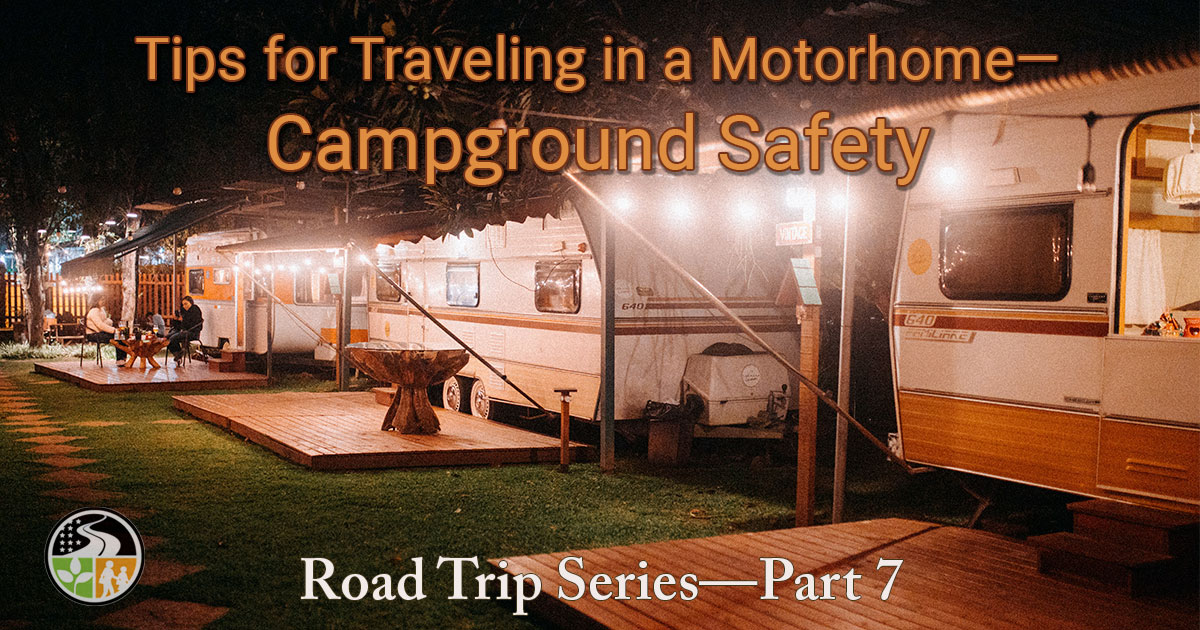Tips for Traveling in a Motorhome—Campground Safety (Road Trip Series 7)

You and your family are over the moon about the first road trip in your motorhome. But you’re worried about staying safe in the campground. You’ve heard rumors of wild animals, theft and campfires gone wrong.
How can you stay safe in a motorhome campground? In this article, we cover six areas of campground safety and how you can avoid potential dangers.
Know before you go
Before checking in at a campground, ask the management about safety. Here are several questions that you could ask:
- Do they patrol at night?
- Is there nighttime lighting in the campground?
- Can visitors enter and exit freely?
- Is the perimeter of the park fenced in?
- Do they have surveillance cameras?
Setting up
You can avoid potential dangers at a campground when you are setting up at your site.
Before choosing a site, look up. Do you see trees bending over? Are there dead limbs hanging dangerously close? You might want to avoid that site or ask the staff to take care of any potential dangers.
You may choose to avoid parking too close to water, such as a lake or river. That way, if you stumble out of your motorhome in the dark early morning hours, you won’t accidentally come up wet and sputtering.
Are poison ivy or poison oak common in the area? How about nests of stinging or biting insects? If you see any of these unwelcome risks, you may wish to choose another site. It would also be good to point out the danger to others—especially children.
Also, check your camp area for sharp objects like broken glass, rocks or sticks.
Feel more secure
From an alarm system to motion detector lights, there are a lot of ways to keep your motorhome safe. Newer motorhomes might already have a security system.
To reduce temptation, you can also opt to put shades on the windows and get a safe for valuables. And whenever you leave your motorhome, take a moment to make sure you have locked up.
Health emergencies
Emergency kits are a basic necessity in motorhome equipment. An emergency kit doesn’t have to be huge, but it should be useful for the situations you might encounter in the area you’ll be traveling through. A kit should contain supplies and medicine to deal with allergic reactions, skin rashes and minor wounds.
Contain the campfire
If you’ll light a campfire, consider using metal rings or lining the space with stones or rocks to contain the fire. Also, plan how you’ll put the campfire out. Do you need water, dirt, or a shovel at hand?
Wildlife is cute . . . from a distance
Keep in mind that those fuzzy animals that look so adorable in pictures can be quite aggressive or may even carry diseases. Find out in advance which wild animals are likely to be in the area you’re camping and have a plan to deal with close encounters.
How National Highway Safety Administration can help--We want every trip you take to be safe. See how our online drivers ed classes can help. We offer parent taught courses for new drivers seeking their learner's permit. Our defensive driving courses or basic driver safety courses are designed to help reduce your insurance rates or even or remove points from your driver's license.
- 2023
- 2022
- 2021
- 2020
- 2019
- 2018
- 2017
